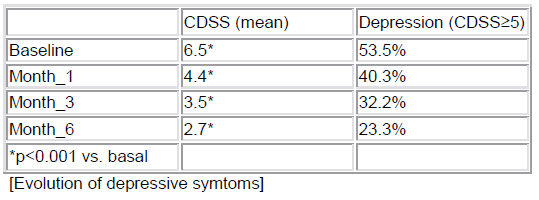Published online by Cambridge University Press: 16 April 2020
Depressive symptoms in patients with schizophrenia has been associated with overall worse outcomes.
Assess the prevalence and evolution of depressive symptoms, measured with the Calgary Depression Scale for Schizophrenia (CDSS), and its importance in subjective evaluation.
Non-interventional, prospective (6 moths of follow-up) study of a cohort of patients with schizophrenia of schizoaffective disorders who have had a clinical relapse that required a change in the therapeutic strategy.
305 patients were included, 288 (94.4%) was the population analyzed and 272 (89.1%) completed the follow-up. 226 (78.5%) of patients have a diagnosis of schizophrenia, the rest were diagnosed of schizoaffective disorder.

CDSS (unlike SWN-K, PANSS, DAI-10, ICG-G nor PSP) at baseline was correlated (r = −0.18497, p = 0.0016) with Patient Global Impression (PGI) in month_6.
Depressive symptoms were the only ones at baseline with statistically significant association to positive response in SWN-K and PGI in the multivariate analysis.
Over 50% of patients had depression in relapse time, with a good progress of those symptoms in the follow-up period.
Depressive symptoms were the unique at baseline associated with a good subjective evaluation from the patient.
Comments
No Comments have been published for this article.